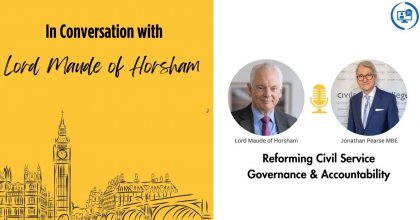Written by Ben Yardley, International Coordinator
Civil Service College kicked off our 2024 online In Conversation series with an important question: how does the way the Civil Service is governed from above need to change?
Director of International Partnerships, Jonathan Pearse, sat down with Lord Francis Maude to discuss the findings of his recent Independent Review of Governance and Accountability in the Civil Service. Lord Maude’s expertise in this area is extensive, having served as an MP for over twenty years, holding ministerial appointments in the Treasury, Foreign Office and Cabinet Office, and also acting as Chair of the Conservative Party.
For the full discussion, see YouTube video at bottom of page:
On the progress made since 2012
Lord Maude cited a number of successes from his time as Minister for the Cabinet Office under the Coalition government, including the introduction of five-year terms for Permanent Secretaries, the ‘Functional Model’ and the creation of bodies such as the Government Digital Service, Crown Commercial Service and the Major Projects Authority.
However, serious problems still remain; Lord Maude recounts unearthing a reform plan from 1921 which mentions many of the same issues the Civil Service is grappling with today! Issues such as churn, insularity and a lack of specialist subject knowledge are long-standing and systemic, but they are worsened by the lack of strategic direction, and of clear responsibility for fixing them, coming from the top.
On creating a separate Head of the Civil Service
Lord Maude summarised the problem with the Civil Service succinctly: “there’s no one in charge”. Though the Cabinet Secretary is theoretically responsible for running the Civil Service, this is only one of a long list of duties, and one which is all too often not given the attention it deserves. All this creates a muddled picture: “there’s a lack of clarity, and when there’s a lack of clarity, responsibility and accountability is poor.”
On how the Civil Service must change to meet the challenge of the climate crisis
Another issue with the current structure of the Civil Service is the difficulty of implementing initiatives that require the cooperation of more than one department. The ‘silo model’ of funding, where the Treasury allocates resources to each department separately, makes cross-cutting projects harder to succeed.
Because so many of the most serious challenges the UK will face in the next few decades, including climate change, cannot be placed neatly under one department, Lord Maude believes that redrawing the boundaries of what each department is responsible for is not a real solution. Only changes to the way resources are allocated will equip the UK Civil Service to meet his challenge.
On Whitehall Reform after the election
The election will see either a Conservative party with a renewed mandate, or a Labour party returning to government after years in the political wilderness. While reform is not expected before the election takes place, the period immediately following it will provide a real opportunity for reform.
Lord Maude is clear: “the time to do this is day one”. Whatever hue the new government takes, they must begin 2025 on the front foot and set the practices for their government to follow, or risk wasting another opportunity to fix longstanding problems.

